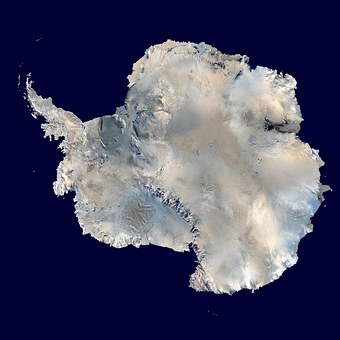
Antarctica by Derek Mahon is a poem based on the infamous ill-fated Scott expedition of Antarctica in the early 20th century, especially the fate of Captain Oates who sacrificed his own life for the sake of his companions and friends. Mahon wisely uses the line, “I am going outside and maybe some time,” as the first line and thus sets the tone for the upcoming events. The author has captured the image of the personality of a thought provoking character while still focusing on poetic forms and thought provoking images. The poem is written in free verse and makes use of several metaphors throughout. In every three line stanza, the first and the third line rhyme and the rhyming scheme is aba except in the last stanza where it is abaa.
Antarctica | Summary and Analysis
Antarctica | Analysis, Lines 1 to 3
‘I am just going outside and may be some time.’
The others nod, pretending not to know.
At the heart of the ridiculous, the sublime.
The poet begins the narrative by informing the reader that the protagonist, that is, Captain Oates, is going outside for some time to do some work and it may occur that he is out for a while. His companions acknowledge ‘pretending not to know’ about why he was going outside.
The poet, here, makes the reader anticipate what is coming later in the second line. In the last line of this stanza, the poet references the English idiom “from the ridiculous to the sublime,” meaning something going from being silly, foolish or absurd to being exceptional or beautiful. The first three lines set the mood of the poem and intrigue the reader to find out what will happen later on.
Antarctica | Analysis, Lines 4 to 6
He leaves them reading and begins to climb
goading his ghost into the howling snow;
He is just going to walk outside, and may be some time.
The man, after informing his companions, leaves them reading; though the reader is not told what ‘reading’ means here. It could be possible that they are reading some book, newspaper etc. but on the other hand, ‘reading’ can also be a connection to the opening line of the poem where he tells them that he is going outside. This further sets the ominous mood the poem is leaning towards. The man starts climbing and he ‘goads his ghost into the howling snow’: a possible meaning here is that he calls for his spirit to not give him up, he wants to fight and even in the cold blizzard that is taking place outside, his resolve doesn’t crumble and he continues to climb. The poet, then, assures the reader that he is just going to take a walk for some time but the repetition of the phrase ‘and maybe some time’ forces the reader into thinking that if the assurance is just an empty promise and the calm before the storm that is approaching.
Antarctica | Analysis, Lines 7 to 9
The tent recedes beneath its crust of rime
And frostbite is replaced by vertigo;
At the heart of the ridiculous, the sublime.
The man continues to move on to his ‘walk’ and the tent, in which his companions are sitting, starts to disappear due to the extremely low temperature and frost; the scene here is cold and grey. Due to the cold, first, the man gets frostbite and he starts to have difficulty moving his legs and arms. After some time, his condition worsens and vertigo sets in resulting in dizziness and nausea. One may get an image of him desperately trying to breathe and stay alive. The third line is repeated here and the reader gets the impression that even when his organs are close to giving up, the man thinks that there is beauty in that ‘ridiculousness’ too, if one looks closely.
Antarctica | Analysis, Lines 10 to 12
Need we consider it some sort of crime,
This numb self-sacrifice of the weakest? No,
He is just going outside and may be some time –
This stanza begins with a question to the reader; the poet asks if it is necessary to lower the valour of the people who are weak, who can’t do much but sacrifice themselves and come off as even better than the people who are fighting. He inquires the reader if it is right that their sacrifice is reduced to nothing and is referred to as a crime. The port further repeats the sixth line of the poem to reassure the reader that, no it is not right to do so and the man has just come out to take a walk, it will take some time. The lat line here may be an insight into the thoughts of the man as he remembers his words to his companions as he is trying to fight for his breath. At this point, the reader is anxious about the fate of the man, the word ‘sacrifice’ makes one sympathetic for the man as the reader dreads the calamity that is sure to fall upon him
Antarctica | Analysis, Lines 13 to 15
In fact, for ever. Solitary enzyme,
Though the night yield no glimmer there will be glow,
At the heart of the ridiculous, the sublime.
In the previous line, the author said that it would take him some time to go back to his tent, but in the next line itself, he acknowledges that, in fact, the time in which he would return to his tent is infinite, it would take him forever as he is very close to taking the last breath of his life. He starts to recede into the night, alone, without anyone else by his side he takes his last breath. The port assures the reader that though he is alone in the cold and the dark and though it is known that the night would soon approach and succumb everything to dark where there won’t be even a glimmer of light, the man will have a sparkling glow in his soul because he is going to a place where he would be finally at peace without the worldly stance. The last line, though repeated, finally makes sense to the reader as they understand that though the man died and is somewhere beyond, he is at peace and there is a glow in his soul.
Antarctica | Analysis, Lines 16 to 19
He takes leave of the earthly pantomime
Quietly, knowing it is time to go:
‘I am just going outside and may be some time’
At the heart of the ridiculous, the sublime.
The man, indeed, takes his last breath and leaves the world in peace and hope in his heart. He knows that it is time to go and doesn’t want to hold onto the world anymore, he is going to a place where he would finally be at rest and he doesn’t want to delay his leave. He remembers his last words to his companions which are the last words spoken in his lifetime. When he spoke those words, he was hopeful that he would be back and he would meet them again. This time, he knows that there is no saving him and he will not see his friends or family again. The poem ends with the same line as the previous stanza, on a hopeful note, that even in death, there is beauty and peace. The reader is left in awe and in a state of bafflement by the author.
Antarctica | About the author- Derek Mahon
Derek Mahon was an Irish poet. He was born on the 23rd of November, 1941 in Belfast, Northern Ireland but lived in a number of cities during the course of his life. In the era of free verse, he often wrote in received forms, using a broadly applied version of iambic pentameter. At his death, it was noted that his “influence in the Irish poetry community, literary world and society at large and his legacy is immense. He died on the 1st of October, 2020 in Cork, Ireland after a short illness.



